Hi, I’m Michael Zhang — a passionate Chinese traveler with a deep love for cultural exploration and immersive journeys. Over the years, I’ve traveled to more than 30 countries, always seeking out architectural landmarks that embody both historical significance and modern innovation. Rather than ticking off tourist checklists, I prefer to dive into the deeper cultural and historical context of each destination. Today, I’d like to take you on a journey to one of Beijing’s most futuristic structures: the CCTV Headquarters Building, a true icon of contemporary architecture and a symbol of China’s modern media presence.
Summary
- CCTV Headquarters Building Overview
- Design Details of the CCTV Headquarters Building
- Suggested Viewing Route for the CCTV Headquarters Building
- Recommended Photo Spot for the CCTV Headquarters Building
- Recommended Restaurants Near the CCTV Headquarters Building
- How to Get to the CCTV Headquarters Building from Downtown Beijing
- FAQ
CCTV Headquarters Building Overview
The CCTV Headquarters Building, often referred to as the “New CCTV Tower,” is the home of China Central Television and one of the most iconic landmarks in Beijing. In 2007, TIME magazine recognized it as one of the Top Ten Architectural Marvels in the World, and in 2013, it was awarded the Best Tall Building Worldwide by the Council on Tall Buildings and Urban Habitat. The CCTV building complex consists of three main structures: the Main Building located in the southwest, the Television Cultural Center (North Annex) in the northwest, and the Energy Service Center in the northeast corner. The entire campus covers an area of 187,000 square meters, with a total floor space of approximately 550,000 square meters.
- Address: Intersection of East Third Ring Road Middle and East Third Ring Road Service Road, Chaoyang District, Beijing (Apple Maps/Amap)
- Public Access: Not open to the public
- Height: 234 meters (52 floors)
- Recommended Visit Duration: 0.5 to 1 hour
- Best Season to Visit: Year-round
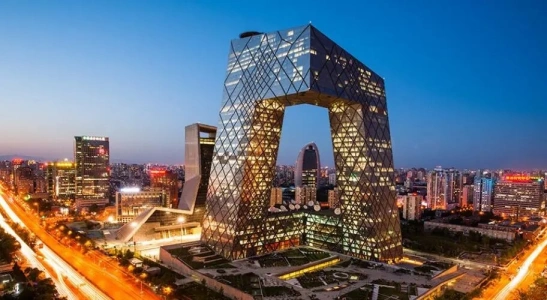
Design Details of the CCTV Headquarters Building
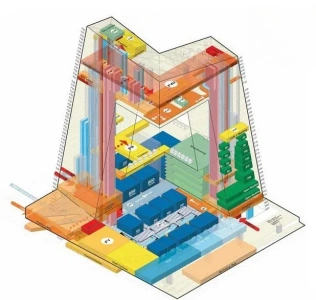
The building’s architectural style is defined by its innovative geometric form. Two leaning towers are connected by a cantilever at the top and a bridge at the base, forming a continuous loop often described as a “three-dimensional cranked loop” or a “spatial circuit.” This design breaks away from the conventional vertical design of skyscrapers and creates a dramatic visual impact, symbolizing openness and innovation in the media industry.
In terms of form and function, the building’s shape was developed around the television production workflow. Office spaces, studios, and technical support areas are all efficiently integrated through spatial interconnections. This harmonious union of function and form reflects and expands on the modernist ideal that “form follows function.”
Culturally, the design blends elements of traditional Chinese philosophy with a global architectural vision. The loop structure represents unity and connection, core values in Chinese culture, while also embracing experimentation in contemporary architecture.
Regarding materials, the building features a steel framework to support its complex shape, along with a curtain wall system of glass panels that give it a futuristic and transparent appearance. The façade includes a distinctive geometric lattice pattern that enhances its visual dynamism. Since Beijing is located in an active seismic zone, materials were carefully chosen for earthquake resistance. High-strength concrete and fire-resistant components ensure structural integrity under extreme conditions.
Structurally, the building’s two leaning towers and the horizontal cantilever form a looped “Z” shape. This design defies traditional straight-line skyscraper engineering, presenting substantial challenges. To address gravity and wind loads, architects collaborated closely with structural engineers, using simulations and physical testing to optimize the design. The building utilizes an external diagrid exoskeleton composed of intersecting steel beams and columns, which serves both an aesthetic and structural purpose. This system effectively distributes loads and supports the additional stress caused by the cantilevered sections. Advanced seismic technology was also applied, including specially engineered expansion joints within the cantilever that allow for stress relief during seismic activity.
Suggested Viewing Route for the CCTV Headquarters Building
The area surrounding the CCTV Headquarters Building is a classic slice of Beijing’s Central Business District (CBD) skyline. If you’ve already explored Beijing’s historic hutongs, ancient palaces, and picturesque parks, consider shifting gears and taking in the city’s modern pulse. The CBD offers a vibrant look at contemporary Beijing, with the CCTV Building as its centerpiece.
Recommended route: Exit from Guomao Subway Station, Exit A → Louis Vuitton (China World Mall) → China World Mall North Section → Intersection of Jinghua South Street and Jintong East Road → Guanghua Bridge → Guomao Bridge
Recommended Photo Spot for the CCTV Headquarters Building
Due to its sheer size, the CCTV Headquarters Building cannot be fully captured from its base. A highly recommended photo spot is the 6th floor of the North Section of China World Mall.
- Photo Location Tip: Head to the 6th floor of the North Section at China World Mall. If you’re unsure where that is, simply search for bluefrog (China World Mall) (Apple Maps/Amap). You’ll find the terrace nearby.
- Subway: Take Line 1 to Guomao Station, Exit E2 Northwest
- Cost: The terrace is part of a public area and free to access
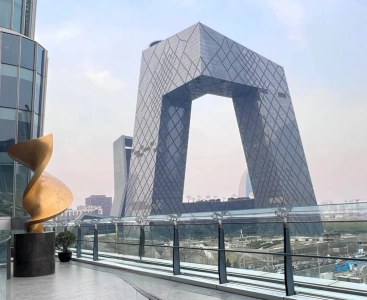
Recommended Restaurants Near the CCTV Headquarters Building
The best dining options near the CCTV Headquarters Building are inside Beijing’s China World Mall. Many of these restaurants offer views of the tower, though the average cost per person is typically above 100 RMB.
Lotus Thai Restaurant (China World Mall Branch)
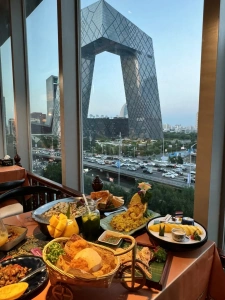
- Why Visit: This long-standing Thai restaurant offers excellent views and is considered one of the better dining choices in China World Mall.
- Address: Floor 5, NL5011, North Section, China World Mall, No. 1 Jianguomen Outer Street, Chaoyang District, Beijing (Apple Maps/Amap)
- Hours: Monday to Sunday, 11:00–15:00, 16:30–21:00
- Average Price: 162 RMB per person
How to Get to the CCTV Headquarters Building from Downtown Beijing
If you’re heading directly to the CCTV Headquarters Building, the best way is to take Subway Line 10. For a full photo-op, take Subway Line 1 or 10 to Guomao Station, where you can access the China World Mall and capture wide views of the tower from above.
By Subway
From downtown Beijing, take Subway Line 10 to Jintai Xizhao Station and exit from Exit C. You’ll be right next to the CCTV Headquarters Building. Alternatively, take Line 1 or Line 10 to Guomao Station for elevated photo opportunities.
By Bus
The closest bus stop is Guanghua Bridge North (光华桥北). You can take bus lines 113, 140, 405, 488, 650, 687, or 98 to get there.
By Taxi/Ride-Hailing
From central Beijing, a taxi or ride-hailing service will take about 30 minutes and cost around 30 RMB.
FAQ
No, the building is currently not open for public tours, and visitors are not permitted inside.
Essential Beijing Travel Resources
- Comprehensive Beijing Travel Guide 📖
- Beijing Travel Recommendations 🏙️
- Hotel Recommendations 🏨
- Transportation Guides ✈️ 🚇 🚄 🚆
- Essential Travel Tips & Tools 🗺️ 🍜 📱 💸 🌤️ 💊

 English (Malaysia)
English (Malaysia)
 English (US)
English (US)  English (Hong Kong)
English (Hong Kong)  English (Singapore)
English (Singapore)  繁體中文
繁體中文 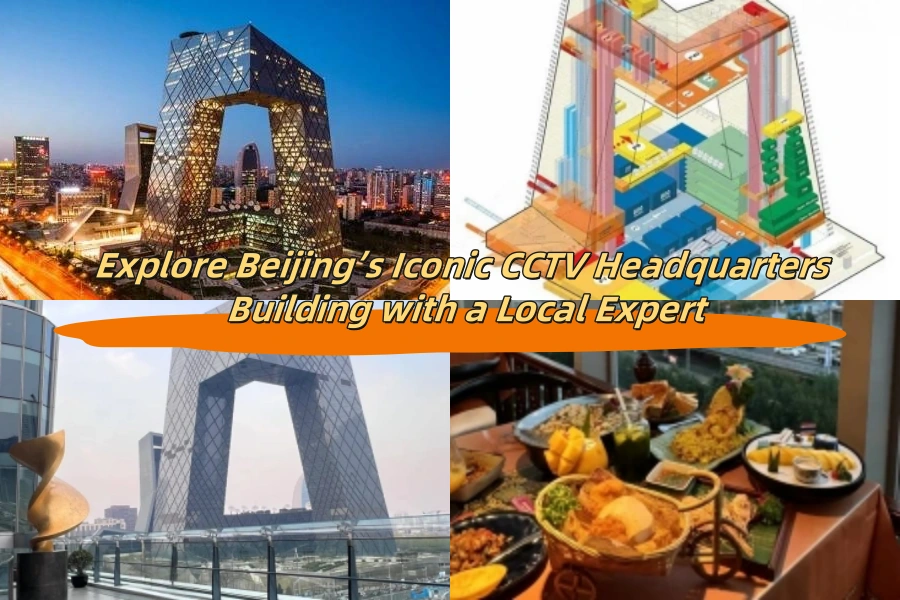
Comment (0)